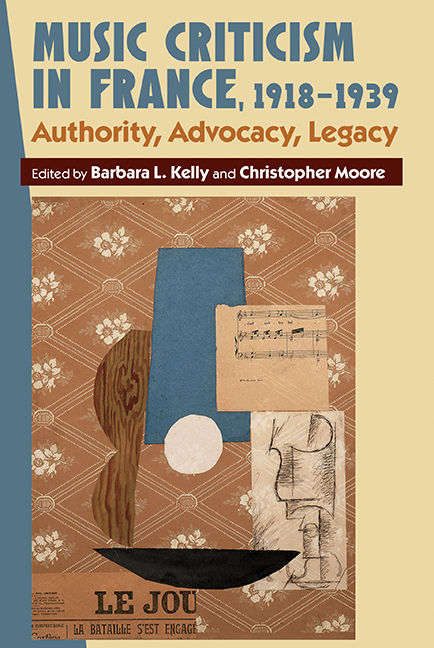Book contents
- Frontmatter
- Contents
- List of Figures
- List of Tables
- List of Contributors
- Acknowledgements
- Introduction: The Role of Criticism in Interwar Musical Culture
- 1 Music Criticism and Aesthetics During the Interwar Period: Fewer Crimes and More Punishments
- 2 Nostalgia and Violence in the Music Criticism of L'Action française
- 3 Charles Koechlin: The Figure of the Expert
- 4 Bleu-horizon Politics and Music for Radio Listeners: L'Initiation à la musique (1935)
- 5 Common Canon, Conflicting Ideologies: Music Criticism in Performance in Interwar France
- 6 Arthur Honegger: Music Critic for Musique et Théâtre (1925–1926)
- 7 A Woman's Critical Voice: Nadia Boulanger and Le Monde musical, 1919–1923
- 8 From a Foreign Correspondent: The Parisian Chronicles of Alejo Carpentier
- 9 Debussy's ‘Reputational Entrepreneurs’: Vuillermoz, Koechlin, Laloy and Vallas
- 10 The Legacy of War: Conceptualising Wartime Musical Life in the Post-War Musical Press, 1919–1920
- 11 Satie, Relâche and the Critics: Controversies and Legacy
- 12 Creating a Canon: émile Vuillermoz's Musiques d'aujourd'hui and French Musical Modernity
- Selected Bibliography
- Index
7 - A Woman's Critical Voice: Nadia Boulanger and Le Monde musical, 1919–1923
Published online by Cambridge University Press: 17 July 2019
- Frontmatter
- Contents
- List of Figures
- List of Tables
- List of Contributors
- Acknowledgements
- Introduction: The Role of Criticism in Interwar Musical Culture
- 1 Music Criticism and Aesthetics During the Interwar Period: Fewer Crimes and More Punishments
- 2 Nostalgia and Violence in the Music Criticism of L'Action française
- 3 Charles Koechlin: The Figure of the Expert
- 4 Bleu-horizon Politics and Music for Radio Listeners: L'Initiation à la musique (1935)
- 5 Common Canon, Conflicting Ideologies: Music Criticism in Performance in Interwar France
- 6 Arthur Honegger: Music Critic for Musique et Théâtre (1925–1926)
- 7 A Woman's Critical Voice: Nadia Boulanger and Le Monde musical, 1919–1923
- 8 From a Foreign Correspondent: The Parisian Chronicles of Alejo Carpentier
- 9 Debussy's ‘Reputational Entrepreneurs’: Vuillermoz, Koechlin, Laloy and Vallas
- 10 The Legacy of War: Conceptualising Wartime Musical Life in the Post-War Musical Press, 1919–1920
- 11 Satie, Relâche and the Critics: Controversies and Legacy
- 12 Creating a Canon: émile Vuillermoz's Musiques d'aujourd'hui and French Musical Modernity
- Selected Bibliography
- Index
Summary
From December 1918 to February 1927 Nadia Boulanger wrote thirty-one columns as a music critic for the French periodical, Le Monde musical. The journal was the mouthpiece for Alfred Cortot's École normale de musique where Boulanger had been appointed in 1919 as the only woman professor, alongside Georges Caussade, Charles Koechlin, Jean Roger-Ducasse, and Florent Schmitt. In addition to her teaching duties, Boulanger was assigned to write criticism about the Sunday evening Colonne–Lamoureux Concerts series, then under the direction of Gabriel Pierné. The series featured works from myriad composers and eras, placing a clear emphasis on French and modern music written both before and after the war. Arguably, the appointment paled in prominence and influence when compared with the visibility offered to writers for Comoedia, Le Temps or Henry Prunières's La Revue musicale (1920). Nonetheless, it bolstered Boulanger's professional position and provided rare exposure for a woman musician's critical voice in the post-war era.
Boulanger produced rich and elaborate texts as a critic, and her work assessed the music of a wide range of composers, including Johann Sebastian Bach, Richard Wagner, César Franck, Vincent d'Indy, Franz Liszt, and Alexander Scriabin. She also celebrated the efforts of conductors and performers whom she admired, including Pierné and mezzo-soprano and family friend, Claire Croiza. Much of her work, as Jeanice Brooks has compellingly shown, was ‘deeply rooted in pre-war cultural and social patterns’, although some of the debates to which she alluded were particularly topical during the interwar years. Although recent studies, including Barbara Kelly's Music and Ultra- Modernism in France: A Fragile Consensus, have not explicitly focused on Boulanger's work, the pedagogue and critic participated in many of the aesthetic battles of the post-war generation by treading lightly and, more often than not, playing advocate on both sides. Thus, as we shall see, she venerated both Claude Debussy and d'Indy and declared a space in the canon for both Erik Satie and Maurice Ravel.
Boulanger's work therefore provides a further dimension to what is commonly depicted as a debate shared between men. For instance, Mary Louise Roberts has argued that ‘the authors of the post-war debate were mostly middle-class men, who had control of the press, sat in parliament, and dominated the literary world’.
- Type
- Chapter
- Information
- Music Criticism in France, 1918–1939Authority, Advocacy, Legacy, pp. 169 - 192Publisher: Boydell & BrewerPrint publication year: 2018



